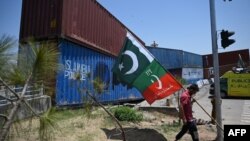Pakistani police Tuesday detained hundreds of supporters of former Prime Minister Imran Khan, a day before he is due to lead an anti-government march on the capital, Islamabad, to press his demand for fresh elections.
The crackdown was unleashed shortly after midnight, with police units raiding homes of supporters of Khan’s Pakistan Tehreek-e-Insaf (PTI) party in the country’s most populous Punjab province in a bid to deter them from attending Wednesday’s planned march.
Khan, 69, has promised to gather tens of thousands of supporters in the city, saying they will not leave until after the government announces a date for elections. He was ousted following a no-confidence vote last month.
Officials and witnesses said a policeman was killed in the provincial capital, Lahore, when they entered a home in the darkness of the night and its nervous occupants opened fire.
Dozens of PTI supporters have also been arrested from areas in and around Islamabad.
Fawad Chaudhry, a spokesman for the opposition party, alleged that police had rounded up at least 400 of their supporters across Pakistan and the security raids were continuing.
Prime Minister Shehbaz Sharif’s government and provincial officials confirmed the police action but declined to share further details.
Interior Minister Rana Sanaullah told reporters Tuesday that his government had decided to not allow the PTI to hold its planned protest march to spread "chaos and disorder."
Khan condemned the crackdown against his party leaders and workers, saying peaceful protest was the right of all Pakistanis and “the brutal” action would not deter them from going ahead with the protest rally.
Addressing a televised news conference, he asked the country’s judiciary and the “neutrals,” a reference Khan uses for the powerful military, to stop authorities from illegally raiding citizens’ homes and blocking them from exercising their democratic right.
"You need to understand that the public is looking toward you and you will also be judged. You will be equally responsible if the country goes towards destruction,” Khan warned. He spoke from Peshawar, the capital of Khyber Pakhtunkhwa province, governed by his party.
There was no immediate reaction from the military, which has a long history of meddling in Pakistani politics. But military officials maintain it is for political parties to defuse the current crisis, saying they remain “neutral” in political affairs. Skeptics question these claims.
Meanwhile, authorities have increased security in the Pakistani capital, deploying additional paramilitary rangers to assist police in maintaining security, particularly that of the diplomatic enclave housing embassies.
Police have placed shipping containers on major roads leading into key areas of Islamabad to prevent Khan and his supporters from reaching the city and staging the planned sit-in.
'US conspiracy'
An opposition-led parliamentary vote of no-confidence unseated the cricketer-turned-politician in April, bringing down his nearly four-year-old government amid controversial allegations of bad governance and economic mismanagement. Sharif led the vote and eventually replaced him.
The deposed Pakistani leader rejected the vote against him as illegal, alleging the United States conspired with his political opponents to plot his ouster to punish him for pursuing an independent foreign policy for his country. He has not offered evidence to substantiate his claims.
"Whenever the next elections take place, not only will we run, but I can predict that this will be the biggest party in Pakistan's history, because people are so incensed and feel insulted that these criminals have been foisted upon us," Khan told CNN on Monday, referring to the Sharif-led coalition government.
Washington has from the outset rejected Khan’s allegations as not true. Sharif has also dismissed the so-called “foreign conspiracy” claims as a “pack of lies.”
"We are not going to let propaganda, misinformation, and disinformation – lies – get in the way of any bilateral relationship we have, including with the bilateral relationship we have with Pakistan, one we value,” U.S. State Department spokesman Ned Price told a regular news conference earlier this month.
Sharif took the oath of office last month on a day when a court was due to indict and send him to jail in a massive money-laundering case together with his son, who has recently sworn in as the chief minister of Punjab. Khan claims 60 percent of members of the new Cabinet are on bail in criminal cases ranging from corruption and money laundering to murder.
Khan’s anti-U.S. rhetoric has strained Islamabad's already tumultuous relationship with Washington.
The former prime minister was in Moscow and met President Vladimir Putin on February 24, when Russian forces invaded Ukraine. Khan has defended his visit, saying it was planned long before his trip and aimed at forging closer economic ties with Russia. Khan declined to condemn the military action.
The Sharif government has vowed to work closely with the Biden administration to improve bilateral ties.
On Monday, the U.S. embassy announced the arrival of new American Ambassador Donald Blome in Islamabad, nearly four years after his predecessor departed Pakistan. Mutual tensions were reportedly one of the factors for the post being vacant for so long.





